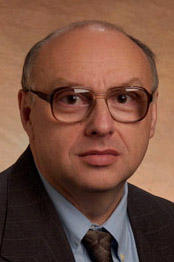
A highly regarded name in the field of optics was recruited a year ago to CREOL, the College of Optics and Photonics, for his expertise in multiple areas of research.
Yehuda Braiman, Ph.D., brings more than 20 years experience as a distinguished research and development scientist at Tennessee’s Oak Ridge National Laboratory, along with a joint faculty professorship at the University of Tennessee, Department of Mechanical, Aerospace and Biomedical Engineering.
Along with experience in lasers and optics, his research interests include developing fast and energy-efficient cryogenic (ultralow temperature) computer memory and studying mechanisms of ultralow sliding friction in the area of materials science. Braiman received a formal invitation from UCF to join the faculty as a research professor in March 2020. It was an easy choice, he said, because CREOL scientists impressed him with their skill and knowledge.
“The extraordinary strength of the CREOL faculty was one of my main motivations in coming to UCF,” said Braiman. “In such a short amount of time I have found myself becoming a part of a welcoming family, in an environment surrounded with excellent scientists who are as passionate about innovation as me.”
Braiman’s current laboratory focuses on semiconductor diode lasers and phase-locking of diode arrays. In addition to experimental work, his projects include theoretical and computational research developing basic understanding of single diode laser and diode laser array dynamics; laser coupling; and disorder-enhanced synchronization mechanisms. His work showing that adding disorder promotes synchronization and eliminates chaos was the subject of a cover story for Nature.
Blue lasers currently hold his interest. These lasers are at the core of what makes technology like Blu-ray players, cell phone displays and LCD projectors feasible. Braiman is pushing their continued evolution and utility, including taking advantage of their strength underwater.
The wide variety of research interests and the combination of experimental and computational approaches to research is an important asset for students under his mentorship, Braiman said. In our rapidly changing world, students equipped with multiple research skills may have better employment opportunities as they graduate, he said.